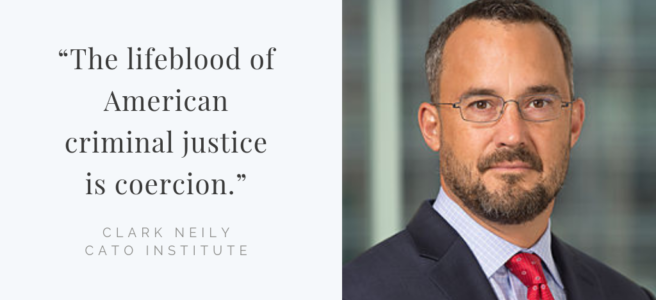Plea bargains. They’re just fair, arms length deal between the government and someone who committed a crime, right? Well, sometimes it might be. But if you get caught up in the criminal justice system, there are forces at work that you probably never contemplated.
Only a very small percentage (less than 5%, depending on the jurisdiction) of criminal cases actually go to a jury trial. That number alone means that the plea bargaining system is driving the criminal justice bus.
And whatever drives the bus in our criminal justice system needs to be fine tuned to deliver justice. Hence the “justice” in criminal justice. Well, the system is very efficient, but does it produce justice?
And whatever drives the bus in our criminal justice system needs to be fine tuned to deliver justice. Hence the “justice” in criminal justice. Well, the system is very efficient, but does it produce justice?
In this episode of the Personal Responsibility Lawyer podcast, I talk to Clark Neily, Vice President of Criminal Justice a the Cato Institute. Clark tells us why we should have grave concerns about whether justice is the primary product of the criminal justice system. The 6th Amendment to the US Constitution guarantees a defendant the right to a public trial. But when someone tries to exercise this right, prosecutors often retaliate. In some sense, it’s understandable. They have cases to move and trials take up a lot of time and resources. If even half of those accused took advantage of their 6th Amendment rights, the system would grind to a halt without massive structural changes.
Clark talks about the reality of the problems, why the system can be terribly coercive to innocent people–and even guilty people–and proposes several things we can do to make the system work better and produce more justice. Among the solutions is the return of conscientious acquittal, which is now more often referred to pejoratively as jury nullification.
If you find criminal justice issues important, following Clark on Twitter is a must. You can do that here.
He also wrote a book a few years ago called Terms of Engagement that I highly recommend. (We will all overlook the fact that I called it “Judicial Engagement” during the interview. He was too kind to call me out for it!)
I hope you find this episode as interesting–and a bit frightening–as I did. If you do, please review the podcast on iTunes.
You can also listen on Spotify.

